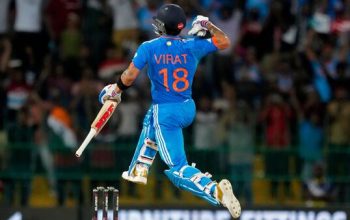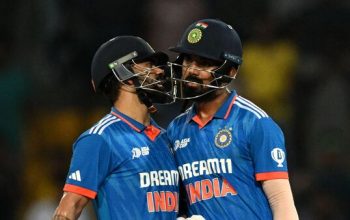The pair played a speed-chess tiebreaker on Sunday to break a deadlock in their competition to replace Magnus Carlsen, who announced last year that he wouldn’t defend the crown he had won on five successive occasions. Ding, 30, had less than 60 seconds remaining on the clock as he pounced all over Nepomniachtchi in the fourth game of the tiebreaker, despite playing with the disadvantage of the black pieces.
Once Nepomniachtchi realized the situation and time wound down, he quickly resigned and left the board.
Ding, meanwhile, sat motionless with his head in hand, freshly anointed as the game’s first ever male world champion from China. His victory capped a remarkable recovery from a tumultuous series of events that looked like they might doom his chances at victory after he trailed at several points during the match.
“Quite relieved,” said Ding, who took home $1.2 million with the title. “The moment when Ian resigned the game was a very emotional moment. I can’t control my mood, my feelings. I know myself. I will cry, I will burst into tears.”
The title, however, comes with an unusual rub. Ding may now rule chess, but he can’t fully claim to be the world’s best player. That distinction still belongs to Carlsen, the highest rated player of all time.
Carlsen’s decision to step away left Nepomniachtchi, the world No. 2, who had lost to Carlsen in 2021, to take on world No. 3 Ding, who had to scrap to qualify for the second spot in this world championship, instead. His arrival could hardly have made the match more dramatic.
One of the curious consequences of having a world championship without the best player on the planet is that there was actual intrigue about who might win, as opposed to past affairs where it was simply a question of who would get slaughtered by Carlsen. And Nepomniachtchi and Ding delivered with a series of exhilarating games.
With months spent in preparation for this one match, and so much time on the clock, mistakes in the world championship are typically rare and the games can sometimes turn into a listless series of draws. But Ding and Nepomniachtchi aren’t Carlsen, so both made their share of miscalculations, and that produced some thrilling outcomes.
Of the 14 games during the classical portion of the competition, six ended with a decisive result and not a draw—which, for chess at this level, is the equivalent of Ali and Frazier trading haymaker after haymaker. When Carlsen demolished Nepomniachtchi in 2021, there were only four decisive games, all won by Carlsen. Three years before that, all of the classical games between Carlsen and American Fabiano Caruana ended in a draw.
The first game victory went to Nepomniachtchi, and it came while he was playing with the black pieces. That raised immediate questions about whether Ding, a player known to occasionally overthink things, would have the mental fortitude to recover. The Chinese grandmaster, who curiously switched hotel rooms at one point in Astana, spent a bizarre amount of the game away from the table in a back room, even when it was his turn.
“I felt a little bit there was something wrong with my mind,” Ding had said after Game 1. “Maybe the pressure of the match.”
Though Ding soon evened up the match, that wasn’t the end of his roller-coaster ride. He gave away the seventh game in excruciating fashion as he failed to make a move for ages even as his clock ticked dangerously close to zero. Commentators watched in shock as Ding appeared paralyzed by indecision.
“He’s frozen completely,” Dutch grandmaster Anish Giri said on the chess.com broadcast. “He broke. He malfunctioned.”
A couple minutes later, after he put himself in a losing position facing the extreme time pressure he put himself under, Ding was left simply to extend his hand and resign the game.
By the next game, Ding had a new crisis to deal with: the apparent leak of his preparation materials. Ahead of major chess events such as the world championship, competitors work extensively with coaches and other top players, known as seconds, to privately study different lines that they are planning to use. For the world champion, the worst off-the-board blunder would be allowing an opponent to know what you’re working on.
But some of Ding’s prep work with his second, grandmaster Richard Rapport, appeared to land on a chess website—giving Nepomniachtchi the opportunity to study and know what his opponent was planning.
“This has to be Ding Liren and Richard Rapport’s accounts, no doubt,” American grandmaster Hikaru Nakamura said on a stream. “That’s just very sloppy.”
Nepomniachtchi downplayed how much the information might help him. He also didn’t deny that his seconds had consulted it.
“My team took a look,” Nepomniachtchi said.
But Ding only steeled himself under pressure. He didn’t lose another classical game after the leak. And when he won game 12, it evened the overall score before two more draws sent it to the tie breakers.
“I guess I had every chance,” said Nepomniachtchi, now a two-time runner-up. “So many promising positions. I probably should have tried to finish everything in the classical portion.”
From aching five-hour grinds of classical chess, Ding and Nepomniachtchi moved into four games of rapid chess with just 25 minutes on the clock apiece. Nepomniachtchi held the historical edge in shorter formats. But Ding had grown into the match, just as he did during the Candidates tournament last year in Madrid that sent these two players to the world championship.
On Sunday, the first three rapid games ended in fairly predictable draws. But the fourth saw fireworks from the start and Ding, for all of his nerves after landing in Astana, played fiercely accurate chess under pressure. The hotel-room switch, the leaked preparation, and the brilliance from Nepomniachtchi were all a distant memory.
Before the pandemic upended traditional, over-the-board competitions, Ding was seen as the strongest threat to Carlsen. Now he’s the champion—raising the question of whether Carlsen will come back to try to dethrone him.







